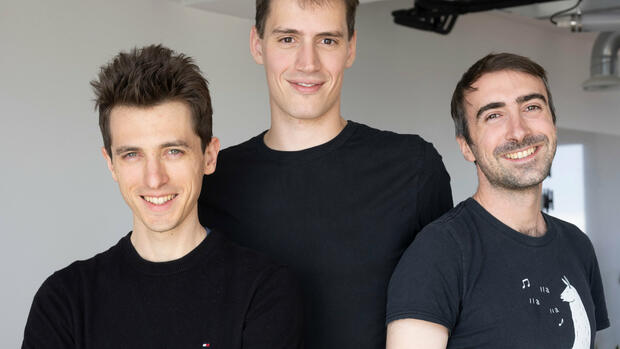The French founders promise their potential customers more transparency when developing their AI language model.
Paris Your company has hardly any employees, no product and no mature business model. Nevertheless, three French founders have now collected 105 million euros from investors, as was announced on Tuesday. Her start-up Mistral AI will use this to build a so-called AI language model for European companies.
What convinced the sponsors is the founding team: CEO Arthur Mensch has been working on large language models at Google’s AI company Deepmind for the past three years. Chief scientist Guillaume Lample led the development of the LLaMa language model at the Facebook group Meta in 2022. And chief technology officer Timothée Lacroix was part of his team there. However, none of the early 30-year-olds have any founding experience.
The news shows that the new hype about artificial intelligence (AI) has finally arrived in Europe. “Now is the time to build big language models,” says Antoine Moyroud of US venture capitalist Lightspeed Venture Partners, who is leading the round. “The size of the financing round reflects the ambition.”
The sum seems small compared to the ten billion dollars that the leading company OpenAI, whose language model is behind ChatGPT, has already been able to collect in the USA. But in Europe, amounts in the hundreds of millions are a rarity for such a young start-up.
Since OpenAI released ChatGPT a good six months ago, start-ups have struck a chord with investors. They see great potential, especially in generative AI. Mistral boss and mathematician Arthur Mensch calls it “the most promising technology of our generation”.
More and more AI investments are flowing into generative AI
The venture capitalist Atomico, which analyzes investments in European start-ups every year, is already observing a strong trend: in 2023, 35 percent of AI investments flowed into companies that develop generative AI. Last year, the proportion was still five percent.
Millions of people have tried out what is possible with generative AI in the past few months. Behind applications like ChatGPT are so-called language models that have been trained with a large number of texts.
They can understand human language and generate texts independently. New applications that could automate and speed up work processes are released almost every day.
Mistral AI’s language model should be designed from the outset for use cases in companies. However, the founders have not yet given many details.
- The first Mistral model is scheduled to be released in early 2024.
- The model should be able to be integrated into company software. At the same time, companies should “retain control of their data and their intellectual property”.
- The software should be available as “open source”, i.e. the source code should be published. Proponents consider this to be particularly safe because security gaps can be discovered and patched quickly.
Mistral relies on transparency with an open source approach
A religious battle has already broken out among the language model providers over the publication of their source code. OpenAI boss Sam Altman rejects the move, citing security concerns. It is conceivable, for example, that the code will be used to spread fake news. But in industry circles it is suspected that Altman wants to protect his sales above all.
Meta boss Mark Zuckerberg, on the other hand, wants to publish at least some of the algorithms in his language model. However, he does not earn money directly with his model, but primarily wants to use it to improve his Instagram and Facebook platforms.
With its push for transparency, Mistral AI relies on a calculation that is becoming increasingly common among European start-ups: Many established companies here mistrust the large US tech groups and their handling of sensitive data. Some of them prohibit the use of US software like ChatGPT in their privacy policies.
More about artificial intelligence
The Heidelberg start-up Aleph Alpha is also building a language model for companies and is wooing customers with high data security. Feiyu Xu, who is stepping down from her position as AI boss at SAP to build the AI start-up Nyonic, is planning something similar.
Mistral boss Mensch says the founders are proud to launch a global project in their native France and to help “make Europe a credible new player in the field of generative artificial intelligence”.
In addition to Lightspeed, numerous other investors from Europe are investing in Mistral, including the German investors La Famiglia and Headline. La Famiglia founder Jeannette zu Fürstenberg told Handelsblatt: “We see Mistral as the only real way right now to build a sovereign European player in artificial intelligence and catch up with companies like OpenAI, which have already received billions in funding.”
Meanwhile, on the same day that Mistral announced its funding round, there was also news from Meta. The tech group, where two of the three founders have developed generative AI in the past few months, wants to use a different approach in the future, in which the AI should learn “similarly to a human being”.
More: SAP loses AI boss – Feiyu Xu prefers to found a start-up
